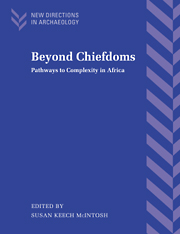Book contents
- Frontmatter
- Contents
- List of figures
- List of tables
- List of contributors
- Preface
- 1 Pathways to complexity: an African perspective
- 2 The segmentary state and the ritual phase in political economy
- 3 Perceiving variability in time and space: the evolutionary mapping of African societies
- 4 Western representations of urbanism and invisible African towns
- 5 Modeling political organization in large-scale settlement clusters: a case study from the Inland Niger Delta
- 6 Sacred centers and urbanization in West Central Africa
- 7 Permutations in patrimonialism and populism: The Aghem chiefdoms of Western Cameroon
- 8 Wonderful society: the Burgess Shale creatures, Mandara polities, and the nature of prehistory
- 9 Material culture and the dialectics of identity in the Kalahari: AD 700–1700
- 10 Seeking and keeping power in Bunyoro-Kitara, Uganda
- 11 The (in)visible roots of Bunyoro-Kitara and Buganda in the Lakes region: AD 800–1300
- 12 The power of symbols and the symbols of power through time: probing the Luba past
- 13 Pathways of political development in equatorial Africa and neo-evolutionary theory
- Index
4 - Western representations of urbanism and invisible African towns
Published online by Cambridge University Press: 14 October 2009
- Frontmatter
- Contents
- List of figures
- List of tables
- List of contributors
- Preface
- 1 Pathways to complexity: an African perspective
- 2 The segmentary state and the ritual phase in political economy
- 3 Perceiving variability in time and space: the evolutionary mapping of African societies
- 4 Western representations of urbanism and invisible African towns
- 5 Modeling political organization in large-scale settlement clusters: a case study from the Inland Niger Delta
- 6 Sacred centers and urbanization in West Central Africa
- 7 Permutations in patrimonialism and populism: The Aghem chiefdoms of Western Cameroon
- 8 Wonderful society: the Burgess Shale creatures, Mandara polities, and the nature of prehistory
- 9 Material culture and the dialectics of identity in the Kalahari: AD 700–1700
- 10 Seeking and keeping power in Bunyoro-Kitara, Uganda
- 11 The (in)visible roots of Bunyoro-Kitara and Buganda in the Lakes region: AD 800–1300
- 12 The power of symbols and the symbols of power through time: probing the Luba past
- 13 Pathways of political development in equatorial Africa and neo-evolutionary theory
- Index
Summary
The problem of archaeological invisibility
This chapter examines certain aspects of the history of thought about the origins of pre-industrial cities in an attempt to better understand why African urban expressions in the archaeological record remained unrecognized and unexamined for so long. In some cases, such as that of the Inland Niger Delta (also discussed in this volume by S.K.McIntosh), these include massive tells that are, on the face of it, difficult to overlook. How could such distinguished observers of the ground as Raymond Mauny (1961: 101–2) or Théodore Monod (1955), for example, walk over the massive site of Jenné-jeno, yet dismiss it with barely a mention? And these are only the most distinguished of the cohorts of prehistorians and natural scientists who, during perhaps a century, have yawned their way over the high and extensive tell remains of many early Middle Niger towns. I contend that they lacked the intellectual toolkit to recognize and process the evidence under their feet. They failed to recognize the town they trod upon because they did not find the expected signs of pre-industrial urbanism, namely, encircling wall and citadel (or palace or temple) reflecting coercive political organization, elite tombs or residences or other accoutrements as monuments to economic social stratification, and monumentality of architecture as monument to state ideology (R.McIntosh 1991:203).
I argue here that our deeply rooted view of the non-Western city as despotic, depraved, and a place of bondage comes out of the tradition of Bible exegesis called Yahwism (or Jahwism).
- Type
- Chapter
- Information
- Beyond ChiefdomsPathways to Complexity in Africa, pp. 56 - 65Publisher: Cambridge University PressPrint publication year: 1999
- 7
- Cited by

